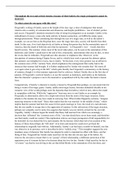Throughout the text and at their demise, because of their hubris, the tragic protagonist cannot be
mourned.
To what extent do you agree with this view?
Fitzgerald’s writing of Gatsby came at the height of the Jazz Age, a time of indulgence that turned
America into a country of consumerism and obsession, and despite prohibition – one of alcohol, parties
and excess. Fitzgerald’s intention remained in that of using his protagonist as an example. Gatsby is the
embodiment of excess, a man who lacks entirely in human connection, yet fulfills the empty space
through possessions. When considering him through the eyes of a tragic lens, as well as the author’s
example, we can see him as the Hegelian hero; once the tragic hero dies, society will benefit from their
death. In this case, if we look objectively at Gatsby as being this poster-boy for the materialistic man of
America, then the death of both him and what he represents – in Fitzgerald’s view – would, therefore
benefit society. The summer, where most of the novel takes place, can be seen as the summation of this
hedonism, and Gatsby’s death near to the end of this, structurally, demonstrates that once he dies, so does
the excess that he embodies. Fitzgerald uses this structure to emphasize this. Moreover, in the
descriptions of summer during Chapter Seven, and its volatile heat work to present the abstract sphere
that summer, our metaphor for excess, has to reality. “In this heat, every extra gesture was an affront to
the common store of life,” narrates Nick, which emphasizes the estrangement that reality had to the
instances that summer had brought. It is further emphasized by Jordan who remarks that “life starts all
over again when it gets crisp in the fall,” which quite literally has Fitzgerald’s commentary on the fantasy
of summer; though it is what summer represents that he criticizes. Indeed, Gatsby dies on the first day of
autumn. If Fitzgerald’s world of Gatsby is to use the summer as hedonism, and Gatsby as the hedonist,
then the character’s purpose is not to be mourned or sympathized with by the reader but learnt a lesson
from.
Comparatively, if Gatsby’s character is merely a lesson by Fitzgerald then perhaps, we can mourn him for
being a victim of his tragic genre. Gatsby, unlike most tragic heroes, becomes debatably likeable in his
romantic view of the world (perhaps more his hamartia than his hubris,) which in turn, allows the reader
to sympathize with him. Whilst the “oppressive” heat may serve to use Gatsby as an example by
Fitzgerald, its abnormality allows for a slight subversion from the norm of the tragic structure. Daisy
alludes to the mistake she may have made in marrying Tom. When Jordan flippantly exclaims, “imagine
marrying someone in this heat!” Daisy then replies that she was married “in the middle of June,” which
implies that the summer had been the cause for her quick marriage to Tom, the result of a rash decision
that she was unable to escape due to the oppression of summer. In this subversion of the tragic structure,
perhaps our sympathy can be earnt, this suggests that Gatsby was not entirely at fault for his own fall.
Arguably, Gatsby’s demise began the minute that Daisy had married Tom which was seemingly a
decision that “affronted” the “common store of life,” one that should have never been made, and therefore
one that Gatsby could not control. This implication relieves our tragic protagonist of full responsibility for
his downfall, he was denied the love and romantic life he desired, which then led to his creation of the
fantasy of Daisy that perhaps she “fell short” of at times and meant he could never get back the
relationship he originally had with her. Additionally, Gatsby’s car has been a symbol of himself, one that
was obtrusive in its presence, now is described to drive “sulkily away.” This metaphor suggests the now
mundane sense of character that Gatsby has adopted in order to maintain his affair with Daisy, and her
liking of him. Fitzgerald has Gatsby make sacrifices for her that rule out any sign of his hubris. He
removes his servants to ensure there is no “gossip” of their relationship, a deliberate protection of her
reputation even if it means he has to be discreet about his love for her. Gatsby’s final sacrifice for her to
“of course” say that he was driving in the car that killed Myrtle is the summation of his devotion, and




